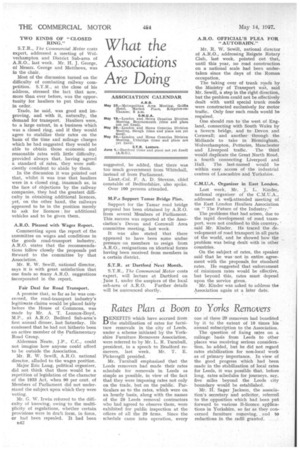What the Associations
Page 52

If you've noticed an error in this article please click here to report it so we can fix it.
Are Doing
TWO KINDS OF "CLOSED RING."
S.T.R., The Commercial Motor costs expert, addressed a meeting 9f Wolverhampton and District Sub-area of A.R.O., last week. Mr. H. J. George, of Messrs. George and Matthews, was in the chair.
Most of the discussion turned on the difficulty of combating railway competition. S.T.R., at the close of his address, stressed the fact that now, more than ever before, was the opportunity for hauliers to put their rates in order.
Trade, he said, was good and improving, and with it, naturally, the demand for transport. Hauliers were, to a large extent, in a business which was a closed ring, and if they would agree to .stabilize their rates on the basis of the time and mileage charges which he had suggested they would be able to obtain those economic and reasonable rates with little difficulty, provided always that, having agreed a standard of rates, they were sufficiently confident to abide by them.
In the discussion it was pointed out that, whilst it was true that hauliers were in a closed ring, inasmuch as, in the face of objections by the railway companies, they had the greatest difficulty in obtaining additional licences, yet, on the other band, the railways appeared to be in the position merely to ask for licences for additional vehicles and to be given them.
A.R.O. Pleased with Wages Report.
Commenting upon the report of the committee on wages and conditions in the goods road-transport industry, A.R.O. states that the recommendations follow closely the proposals put fOrward to the committee by that Association.
Mr. R. W. Sewill, national director, says it is with great satisfaction that one finds so many A.R.O. suggestions incorporated in the report.
Fair Deal for Road Transport.
A promise that, so far as he was concerned, the road-transport industry's legitimate claims would be placed fairly before the House of Commons, was made by Mr. A. 'T. Lennox-Boyd, M.P., at A.R.O. Bedford Sub-area's first annual dinner, last Saturday. He confessed that he had not hitherto been an active member of the Parliamentary Road Group.
Alderman Neate, J.P., C.C., could not imagine how anyone could afford to be outside the Association, Mr. R. W. Sewill, A.R.O. national director, alluded to the wages position.
Major Eric Long, political organizer, did not think that there would be a repetition of legislation of the character of the 1933 Act, when 90 per cent. of Members of Parliament did not understand the subject upon which they were voting.
Mr. G. W. Irwin referred to the difficulty of knowing, owing to the multiplicity of regulations, whether certain provisions were in draft form, in force, or had been repealed. It had been
a42 suggested, he added, that there was too much government from Whitehall, instead of from Parliament.
Lieut.-Col, F. A. D. Stevens, chief constable of Bedfordshire, also spoke. Over 100 persons attended.
M.P.s Support Tamar Bridge Plan.
Support for the Tamar road bridge proposal has been obtained by A.R.O. from several Members of Parliament. This success was reported at the Association's Devon and Cornwall Area committee meeting, last week.
It was also stated that there appeared to have been some undue pressure on members to resign from A.R.O., resignations on identical forms having been received from members in a certain district.
S.T.R. at Dartford Next Month.
S.T.R., The Commercial Motor costs expert, will lecture at Dartford on June I, under the auspices of the local sub-area of A.R.O. Further details will be announced shortly.
A.R.O. OFFICIAL'S PLEA FOR "AUTOBAHN."
Mr. R. W. Sewill, national director of A.R.O., addressing Reigate Rotary Club, last week, pointed out that, until this year, no road construction on a national scale had been undertaken since the days of the Roman occupation.
The taking over of trunk roads by the Ministry of Transport was, said Mr. Sewill, a step in the right direction, but the problem could not be effectively dealt with until special trunk roads were constructed exclusively for motor traffic. Only four such roads would be required.
One should run to the west of -England, connecting with South Wales by a Severn bridge, and to Devon and Cornwall; and another through the Midlands to take in Birmingham, Wolverhampton, Potteries, Manchester and Liverpool traffic. The third would duplicate the Great North Road, a fourth connecting Liverpool and Hull. The last-named would be within easy access of the industrial centres of Lancashire and Yorkshire.
C.NI.U.A. Organizer in East London.
Last week, Mr. J. L. Kinder, national organizer of the C.M.T.5.A., addressed a welleattended meeting of the East London Hauliers Association on " The Future of the Industry."
The problems that had arisen, due to the rapid development of road transport, were not confined to this country, said Mr. Kinder. He traced the development of road transport in all parts of the world, and he showed how the _ problem was being dealt with in other countries.
On the subject of rates, the speaker said that lie was r not in entire agreement with the proposals, for standard rates. He suggested that •enforcement of minimum rates would be effective, but beyond this, rates mint depend upon the service given.
Mr. Kinder was asked to address the Association again at a later date.




















































































